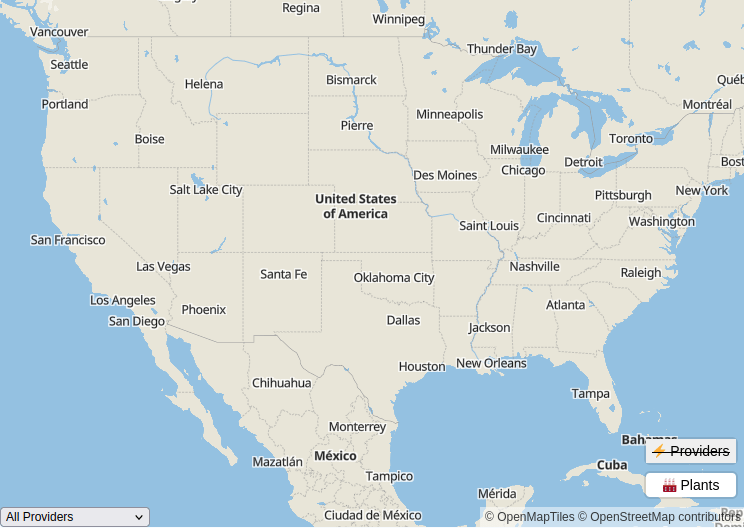Tri-County Electric Cooperative
Electricity Rates, Plans & Statistics
High Power Bills?
Reduce or replace your electricity bill with solar
About Tri-County Electric Cooperative
Tri-County Electric Cooperative is an electric cooperative. The largest county served by Tri-County Electric Cooperative is Richland County, but the company also provides electricity in 4 counties in South Carolina. The average residential electricity price for consumers of Tri-County Electric Cooperative is around 16.41 cents per kilowatt hour. Unfortunately, this is 19.93% more than the state's average rate of 13.68 cents, ranking the company at 43rd out of 50 providers in the state for best average electricity price. There were a total of 309,535 megawatt hours sold via retail sales in 2022 by the provider. The electricity sourced by Tri-County Electric Cooperative is made up of primarily wholesale purchased megawatt hours, with 324,981 megawatt hours procured by the company. The revenue for Tri-County Electric Cooperative for 2022 from electricity sales was $48,512,100, with $45,807,600 coming from retail sales to end users.
The nationwide average monthly residential electric bill is $135.34, while the Tri-County Electric Cooperative average is 32.71% higher at $179.61 per month. Tri-County Electric Cooperative is the 2732nd ranked company in the United States for average monthly bill total. The electricity grid owned by the provider experiences 2.14 outages per customer per year, with outages lasting an average of 185.7 minutes. The US average for other providers is 1.45 outages per customer and 171.11 minutes each outage. Electricity production is not handled in house at the company, as they purchase electricity at wholesale rates from other companies and then resell to their consumers.
Tri-County Electric Cooperative, fortunately, allows consumers to participate in net metering. Net metering allows residents to sell megawatt hours back to the grid, making the purchase of solar panels and other alternative electricity sources more economically viable.
Tri-County Electric Cooperative currently loses around 4.75% of the electricity that they produce via heat dissipation and other causes. The state average for energy loss is 2.57% and the United States average is 2.87%. This leaves Tri-County Electric Cooperative with a ranking of 19th best out of 46 electricity providers in the state and 815th best out of 3526 suppliers in the country.
Tri-County Electric Cooperative Rate & Electric Bills
Tri-County Electric Cooperative residential electric rates are highest in September and the highest average bill is in July.
Historical Electricity Rates:
Go Solar for less than your cell phone bill.
Tri-County Electric Cooperative Overview
- Company Type:Cooperative
- Headquarters:6473 Old State Road Street
Saint Matthews, South Carolina 29135
United States of America - CEO:Chad T. Lowder
Tri-County Electric Cooperative Contact
- Website:www.tri-countyelectric.net
- Customer Service Phone:(803) 874-1215
- Contact Page:www.tri-countyelectric.net
- Social Media:
Tri-County Electric Cooperative Service
- Outage Map:outages.tce.coop
- Outage Phone:(803) 874-1215
- States Served:
- South Carolina
- Counties Served:
- Richland County
- Lexington County
- Orangeburg County
- Calhoun County
- Major Cities Served:
- Hopkins CDP
- Santee
- Gadsden CDP
- Vance
Energy Loss
Tri-County Electric Cooperative's energy loss due to business operations.
Total Energy Loss
15,446MWh
815 National Rank
Grid Reliability
Length & Frequency of Tri-County Electric Cooperative's Power Outages
185.7 min.
vs. national average of 171.11 min.
2.14 outages/yr
vs. national average of 1.45
Go Solar for less than your cell phone bill.
Tri-County Electric Cooperative Coverage Map

Tri-County Electric Cooperative State Coverage
| State | Customers | Sales ($) | State Rank Based On Revenue | % of Provider's Residential Sales in State |
|---|---|---|---|---|
| South Carolina | 18,329 | 45,878,224.32 | 26 | 100% |
Tri-County Electric Cooperative County Coverage
| County | Population | Providers | Avg. County Rate (¢) | Avg. Electric Bill |
|---|---|---|---|---|
| Calhoun County | 14,198 | 3 | 15.06 | $157.90/mo |
| Lexington County | 304,797 | 4 | 14.41 | $150.89/mo |
| Orangeburg County | 83,094 | 5 | 14.50 | $153.47/mo |
| Richland County | 421,566 | 5 | 14.65 | $153.67/mo |
Cities Tri-County Electric Cooperative Has Coverage
- Santee, SC
- Vance, SC
* City coverage generated based on government data. Always verify you can get service from the provider.
Tri-County Electric Cooperative Reviews
Write a Review of Tri-County Electric Cooperative
Tri-County Electric Cooperative FAQ:
How much is the average bundled bill for Tri-County Electric Cooperative customers each month?
The average monthly bundled electric bill for customers of Tri-County Electric Cooperative is $179.61. The state average bundled bill is $141.05 and the nationwide average is $141.05.
What is the phone number for Tri-County Electric Cooperative?
The Tri-County Electric Cooperative phone number is (803) 874-1215.
What is the average bundled electricity rate for Tri-County Electric Cooperative customers?
Customers of Tri-County Electric Cooperative, on average, have an electricity bundled rate 16.41 cents per kilowatt hour (¢/kWh).
Who is the CEO of Tri-County Electric Cooperative?
Tri-County Electric Cooperative's CEO is Chad T. Lowder.
When will Tri-County Electric Cooperative power be restored?
Tri-County Electric Cooperative's outages last, on average, about 185.7 minutes per each outage.
What cities does Tri-County Electric Cooperative provider electricity in?
Tri-County Electric Cooperative has customers in 2 cities.
How many counties does Tri-County Electric Cooperative supply electricity to?
There are 4 counties that receive at least some electricity coverage by Tri-County Electric Cooperative including South Carolina.